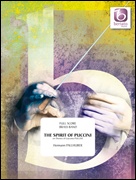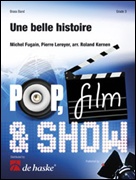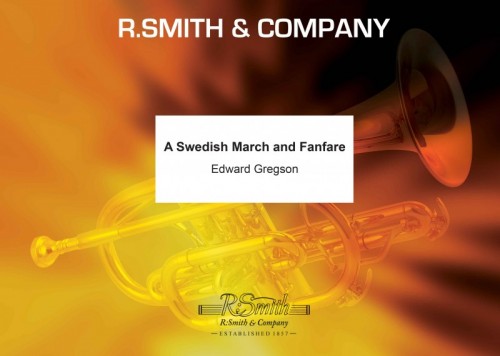Results
-
 £50.90
£50.90SEND IN THE CLOWNS (Flugel Horn Solo with Brass Band) - Sondheim, Stephen - Fernie, Alan
From A Little Night Music. Grade: Easy/Medium.
Estimated dispatch 7-14 working days
-
 £30.00
£30.00SHE'S LEAVING HOME (Low Brass and Percussion feature/Brass Band) - Duncan, Andrew
An ideal concert item to show off the lower band sections, whilst giving the cornet players a little rest! The wonderful Beatles 'sounds' have been cleverly arranged for this feature piece to bring out the real beauty of the music
Estimated dispatch 7-14 working days
-
 £39.95
£39.95SING WITH THE BAND Selection No.1 (Brass Band) - Siebert, Edrich
Includes: Part 1: Tavern in the Town; My Grandfather's Clock; Little Brown Jug. Part 2: Cockles and Mussels; A Farmer's Boy; Loch Lomond; John Brown;s Body. Word Sheet included
Estimated dispatch 7-14 working days
-
 £54.99
£54.99Somethin' Stupid (Brass Band - Score and Parts)
In the sixties Frank and Nancy Sinatra had a huge hit with this delightfully titled song. More recently the timeless Somethin' Stupid has been in the charts once again with the version by Robbie Williams and Nicole Kidman that was featured on the groundbreaking Swing When You're Winningalbum of classic "Rat Pack" songs. Bring a little humour to any concert with this fantastic novelty item. 02:30
Estimated dispatch 7-14 working days
-
 £169.99
£169.99SPIRIT OF PUCCINI, The (Brass Band) - Pallhuber, Hermann
The famous Puccini motifs in this work are taken from Tosca (E lucevan le stelle), Turandot (Nessun dorma), Gianni Schicci (O mio babbino caro) and a quite funny little persifl age of the aria Senti L'ora e vicina from Tosca. The Spirit of Puccini has testing moments for each of the principal players of the band?s sections. Even although the music was inspired by this famous Italian composer, Hermann Pallhuber has succeeded in creating a piece of 'real band music' combining both the Italian influences and the modern British brass band sound. Duration: 16:00.
Estimated dispatch 7-14 working days
-
 £54.20
£54.20THREE CHRISTMAS CAROLS (Brass Band) - Wormald, Christopher
Includes: Away in a Manger; Silent Night; O Little Town of Bethlehem. Grade: Easy.
Estimated dispatch 7-14 working days
-
 £59.99
£59.99UNE BELLE HISTORIE (Brass Band) - Fugain, Michel - Kernen, Roland
For Une Belle Histoire, Roland Kernen took his inspiration from the seventies French singer and composer Michel Fugain and his troop of singers and dancers known as Le Big Bazar. The cheerful melodic line of his 1972 hit Une belle histoire lends itself perfectly for brass band. Add a little French charm to any concert with this throwback to the hippy period of the early seventies.
Estimated dispatch 7-14 working days
-
 £107.95
£107.95WHEN WORLDS COLLIDE (Brass Band - Score and Parts) - Clarke, Nigel
Subtitled: Little Green Men in Intergalactic Spaceships with Ray-Guns and Phasers, A Space Symphony for Brass band. Written for the free choice test piece for Brass Band Buizingen for the Flemish Open Brass Band Championships. When Worlds Collide seeks to recreate the atmosphere and sentiment of the American cult Sci-Fi movies of the 1950's such as Robert Wise's 1951 film 'The day the Earth Stood Still' and 'Invasion of the Body Snatches' directed by Don Siegel in 1956, as well as Rudolph Mate's 1951 film 'When Worlds Collide'. It is programmatic with subtitled sub-sections as follows: Crop Circles; Lights in the Sky; Strange Happenings; Sightings; "We Come in Peace"; Alien Abduction; Analysis of the Earthlings; Teleportation; New Understandings; Visions of Far Off Worlds; Colonisation. Duration: approx. 19 mins.
Estimated dispatch 7-14 working days
-
 £49.95
£49.95WHEN WORLDS COLLIDE (Brass Band - Score only) - Clarke, Nigel
Subtitled: Little Green Men in Intergalactic Spaceships with Ray-Guns and Phasers, A Space Symphony for Brass band. Written for the free choice test piece for Brass Band Buizingen for the Flemish Open Brass Band Championships. When Worlds Collide seeks to recreate the atmosphere and sentiment of the American cult Sci-Fi movies of the 1950's such as Robert Wise's 1951 film 'The day the Earth Stood Still' and 'Invasion of the Body Snatches' directed by Don Siegel in 1956, as well as Rudolph Mate's 1951 film 'When Worlds Collide'. It is programmatic with subtitled sub-sections as follows: Crop Circles; Lights in the Sky; Strange Happenings; Sightings; "We Come in Peace"; Alien Abduction; Analysis of the Earthlings; Teleportation; New Understandings; Visions of Far Off Worlds; Colonisation. Duration: approx. 19 mins.
Estimated dispatch 7-14 working days
-
 £34.95
£34.95A Swedish March and Fanfare (Brass Band - Score and Parts) - Gregson, Edward
A Swedish March:This little march was written in 1975 and was commissioned for the Jnkping Summer School, Sweden, where Edward Gregson was guest composer and conductor. It incorporates the old Swedish folksong Britta at its heart, but otherwise is quite conventional in every aspect.Duration: 3.00Fanfare:This fanfare was originally written for brass ensemble, organ and percussion, under the title Fanfare for Europe, and was commissioned for a concert at the Royal Albert Hall, London, to celebrate Great Britain's entry into Europe. The composer then created this version for brass band which was published in 1976.Duration: 1.30
Estimated dispatch 7-14 working days
